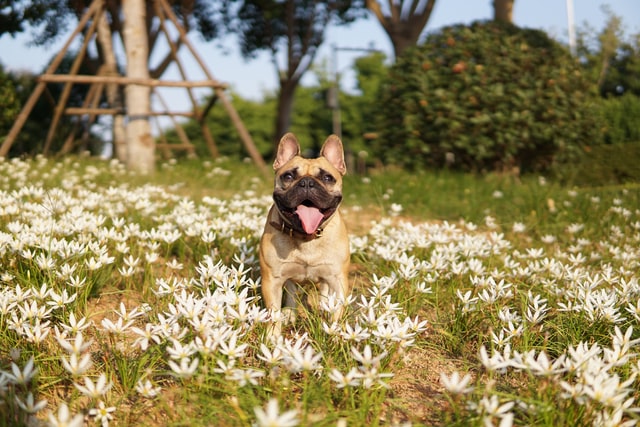The weather has been unseasonably warm in many parts of the US, causing spring to feel like it may arrive a bit early this year. Flowers and trees are blooming, which can wreak havoc on our allergies, and that includes our dogs. So let’s talk about the best ways to protect them. And the best food for french bulldogs.
Dogs are no different from humans in that when the weather is nice, they love enjoy the outdoors. Even if it’s just the backyard.

However, fresh grown grass and gardens can cause our Frenchies to be exposed to a variety of toxic plants and allergens that can cause them great discomfort. If you fertilize your yard or spray for weeds, be sure you are using pet friendly products.
You’ll want to be sure you keep these items stored in a shed or on shelves in the garage so that curious frenchies can’t get in to them.
Wipe your Paws!
Of course you don’t want to keep your dog locked up indoors when the spring weather arrives. You will want to be sure to use a baby wipe to clean their paws and bellies after they’ve enjoyed some time rolling around in the grass. It’s a good idea to wipe down their face and ears as well.
If you want to be proactive you can put a light shirt on your dog for an extra layer between them and any allergens. If you do start to notice your pup itching or scratching more than normal, try an oatmeal bath. After you dry them off, rub some lotion or coconut oil on their skin.
If their discomfort progresses any further, make an appointment to visit with your vet. If you can head off any major allergy outbreak, it can save your Frenchie a lot of suffering; and you a lot of money.
So go on, get outside and play! Frenchies love to run around and be silly. Enjoy the nice weather, just be sure to take precautions so you don’t end up with an itchy pup!
Have You Tested Your Dog for Allergies Yet?
Ok, first if you haven’t tested your dog yet – or even if you have but it was inconclusive – I want to let you know about a pretty simple and easy at home test.
5 Strands Affordable Testing makes at home allergy tests for dogs. They test for hundreds of allergens, both food and environmental.
For the price, it’s a great way to get information on what is causing your dog all the bumps and redness and itchiness. If you want to check it out, click here to get more info —>> Affordable Allergy Testing Kit

Food Allergies
Many people believe that some dogs are genetically predisposed to develop allergies. So once there are exposed to the allergen, symptoms may soon follow. Symptoms of food allergies are much the same as those of environmental allergies.
Irritated or itchy skin, hair loss, and even ear infections. And unlike seasonal or environmental allergens like dust or pollen, your dog can’t avoid food. So if these symptoms seem to be chronic, it might be a food allergy.
A food allergy happens when the dog’s immune system misidentifies an ingredient (often a protein) as an invader. This causes the body to react accordingly and the resulting side effect is an itchy one.
Sometimes food allergies can be misidentified as food intolerance.
However, these symptoms tend to be more gastrointestinal, such as gas, vomiting, or diarrhea. null
Best Food for French Bulldogs
Let’s talk a bit more about food allergies. Honestly, there’s no easy way to deal with it. This journey is long and will consist of a lot of trial and error. Treatment will involve removing common allergens from their diet, then reintroducing them slowly to determine the culprit (or culprits).
Hypoallergenic food for dogs is available in both prescription and commercial options. And as always, you should consult your vet if you think your dog may have a food allergy.
Common Food Allergens
You shouldn’t be surprised to know that the most common triggers for food allergies are the most common ingredients in commercial dog foods. They include:
- Beef
- Chicken
- Corn
- Wheat
- Soy
- Fish
- Pork
Grains also come in to play. You will see a lot of companies boasting their hypoallergenic food for dogs as “grain free.” It’s actually not necessarily the grain that’s the problem. Often, the grains used in dog food are low quality, and can be contaminated with other allergens. Either way, eliminating grains from your dog’s diet is probably a good idea.
Here are a few of the best foods for french bulldogs that you might want to try:
Natural Balance Limited Ingredient – Sweet Potato & Venison

Wellness Simple Natural Limited ingredient Salmon & Potato

P.S. Limited Ingredient – Lamb (This is a 2 lb bag of food. Some people use it as a treat)

Environmental Allergies
This type of allergy is more common. Triggers include grass, pollen, ragweed, mold, and dust mites. Dogs can also be allergic to items found inside the house like cotton, wool, and chemicals in cleaners.
This type of allergy may be a little easier to identify. Your vet may run some tests, however they are never 100% accurate. But it may give you a starting point and help you know what to avoid.
There are definitely many treatment options available (believe me, we’ve been through them all!), so it’s important to work closely with your vet for the best way to manage the allergies.
Unfortunately allergies in dogs are quite common. And they will likely have more than one trigger. They may even have both food and environmental allergies.
It definitely requires some work and persistence to manage the symptoms and keep your dog comfortable. A healthy checking account doesn’t hurt either.
But we’re here to help! Well, not with the money part. You’re on your own there.
So if you’re lucky enough to have own a dog without any allergies at all, congrats! But if you’re like us, hopefully this information will help alleviate some of that itch.

Our Frenchie licks his legs and gets yellow icky stuff between his toes-we have tried numerous vet visits any advice would be appreciated–Thanks
I thought Frenchies were allergic to sweet potatoes
Jacey –
Some frenchies may be allergic to sweet potatoes, but it’s not universal. A lot of times it is one of the proteins in the food that the dog is allergic to. But it could also be potatoes, peas, rice, etc. It really varies from dog to dog, and not so much breed specific. With the exceptions of the foods that are universally bad for dogs (chocolate, onions, etc.).
Thanks!
Eric